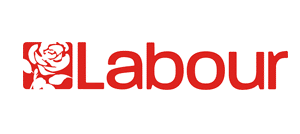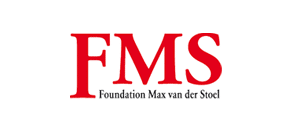Tunisia
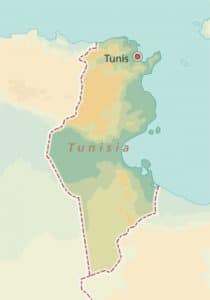
Tunisia used to be the only democracy to have arisen from the 2011 Arab Spring, but has been in turmoil in recent years. Although the 2011 ‘Jasmine Revolution’ had toppled the corrupted Ben Ali regime that was in power since 1989, the new administration remained unable to lift Tunisia from its economic woes. At first, the new political set-up was perceived legitimate, and the Tunisian National Dialogue Quartet was hailed in accommodating Tunisia’s path to democracy. In latest years, public support for the post-2011 setup deteriorated, mainly due to it’s incompetence to improve Tunisia’s economic position.
In July 2019, Tunisia’s first democratically chosen president Beji Caid Essebsi passed away. Kais Saied became his successor after a landslide victory at the 2019 parliamentary polls. Since then, Tunisia is in turmoil. The socio-economic situation is worsening, and demonstrations against incumbent parties over the bad handling of the coronavirus pandemic, corruption and government dysfunction are ongoing.
On July 25, 2021, Saied suspended parliament, dismissed PM Mechichi and ended immunity for parliamentarians. Tunisia is in a process of democratic backsliding ever since and Saied is de facto ruling by presidential decree. He took control over the judiciary and electoral commission and under his rule, security forces repress civil activists, journalists and parliamentarians. Saied also appointed the first female PM, Najla Bouden, in September 2021. Her appointment seemed rather symbolic, as she holds no effective power without a functioning parliament.
In December 2021, Saied proposed a timetable towards a constitutional referendum (July 25, 2022) and early elections (December 17, 2022).
Towards the referendum, an online consultation process should advise amendments towards an constitutional commission. Civil society organizations and political parties have withdrew their support for this process altogether, as Saied has taken power over all policy outcomes. The new constitution, approved by referendum, forwarded more power into the hands of the president and returned Tunisia to a presidential system, replacing its previous balanced parliamentary-presidential structure.
The president got authority over the government and judiciary and is the head of the armed forces. He is also allowed to fire and appoint ministers and judges and may draft laws, treaties and state budgets. Tunisian President Kais Saied has solidified his one-man-rule, by officially dissolving parliament, seizing control of the electoral commission, and enshrining his power through the referendum.
The National Salvation Front, a faction of Tunisia’s main opposition parties, had called for boycotting the country’s elections in December 2022. And in October 2022, thousands of protesters marched the streets of Tunis, denouncing President Kais Saied’s slow move towards authoritarianism. Tunisia’s powerful labour union, the Tunisian General Labour Union (UGTT) has also rejected Saied’s democratic backsliding in December. On 17 December, parliamentary elections were held in Tunisia with an extremely low voter turnout, around 8,8 per cent. This low turnout was caused by the boycott of the opposition and the widespread political disillusionment among the Tunisian population.
In January 2023, thousands of protesters have marched against the seizure of near total power by President Saied, demanding he steps down. In February dozens of public figures who were critical of the president, including politicians, protest organizers, lawyers, judges, union officials, the head of an independent radio station and business leaders, were arrested in often violent night-time raids. He also attacked the judicial system by firing dozens of judges. This has led to protests across the country due to growing fears of a return to autocracy.
-
Want to get notified by mail when this country gets updated?
Subscribe to our newsflash below!
Key Info
1 Political Situation
Tunisian revolution and the political situation under Ben Ali
The current political situation in Tunisia is the result of the popular unrest that erupted in the first half of 2011 after a young man set himself on fire in Sidi Bouzid on 17 December 2010. Before the popular uprising and Tunisia’s legislative elections of 2011, the country underwent a long period of authoritarian rule. The frustration of the man concerning the high unemployment rate, living conditions, the economic situation and annoyance with the ruling elite was shared by many Tunisians. Demonstrations occurred around the country for weeks and resulted in the ouster of President Ben Ali on 14 January 2011. Fouad Mebezaa, the speaker of the Tunisian parliament, was sworn in as the country’s interim president on 15 January and on 17 January a new government was formed by Prime Minister Mohammed Ghannouchi. It is said that over 338 people were killed during the Tunisian uprising.
New election law
The new law, issued in September 2022, prevents anyone who has ever been charged with a legal violation from running. This comes as Saied’s government has initiated harsh crackdowns on his political opponents, accusing many of them of electoral crimes. With Saied’s recent, widely condemned decree that criminalizes the publication of fake news or rumours, it opens the door for Saied to prevent anyone who has criticized him from seeking office. The law also gives the government the power to strip legislators from their offices and from candidacy for life if they are found guilty of receiving illicit donations. Saied has accused several of his political opponents of receiving such donations. The new law also replaced the proportional representation system with voting in single-members districts. Additionally, the law imposed new requirements on candidates and eliminated public funding for campaigns, removed a ceiling on private fundraising, and revoked prior laws promoting gender parity and youth representation on electoral lists. Finally, the decree ramped up punishments for vaguely defined “electoral crimes,” including receiving illegal donations or “intent intentionally exploiting another candidate’s honor or familial or geographic affiliation.”
Lack of a Constitutional Court
Between the 2011 revolution and President Saied’s seizure of extraordinary powers in 2021, elected officials took steps to institutionalize an independent judiciary. Legislation adopted in 2016 established the High Judicial Council (HJC), a body tasked with ensuring the independence of the judiciary and appointing a third of the Constitutional Court judges. Council members were elected that year by thousands of legal professionals. However, governments and lawmakers repeatedly failed to establish the Constitutional Court as envisioned by the 2014 constitution; its role would have been to evaluate the constitutionality of decrees and laws. The absence of such a court became especially problematic in 2021, as there was no authoritative mechanism for assessing the constitutionality of Saied’s emergency measures. While the new constitution preserved both an HJC and a Constitutional Court in name, it granted the president final authority over judicial appointments following nominations by the HJC, whereas the 2014 charter had made the HJC’s appointment recommendations binding on the executive. In addition, the new constitution removed a clause of the 2014 constitution that granted the Constitutional Court authority to rule on the extent of the president’s power.
.
President Saied’s election as a turning point
After President Beji Caid Essebsi passed away in 2019 a new president was chosen in October of that year, law professor Kais Saied. A month later Tunisia also held parliamentary elections that led to a four month long political crisis over the formation of a government. After the elections, the biggest party Ennahda put forward a prime minister from its own ranks, namely agricultural engineer Habib Jemli. In January 2020 Jemli proposed a cabinet made up of independent technocrats in a bid to satisfy the population who had continuously protested against the deteriorating conditions in the country. However, this proposal was rejected by parliament, with only 72 of 217 sets backing it, including by Ennahda’s potential coalition partners. Ennahda was therefore forced to compromise.
It was then up to President Saied to choose a new candidate for prime minister. He chose former finance minister Elyes Fakhfakh, linked to the Ettakatol party, on the 20th of January 2020, hoping that his economic background would help save the worsening economy in the country. However, in July 2020, he resigned in the wake of controversy regarding alleged conflict of interest with company shares he owned. This has never been proven though and in 2022 his name was legally cleared. From September 2020, Tunisia’s new prime minister was the independent Hichem Mechichi. As Saied, he had no previous experience in politics and initiated the formation of another cabinet made up of independents. However since then he has come under more pressure from parliament though, who have raised their price for support, demanding more representation.
As a result, without the consent of President Saied, Mechichi reshuffled his cabinet in January of 2021. Four ministers considered loyal to President Saied were replaced. The largest party in parliament, the Ennahda movement, had been most vocal pushing for a cabinet with more “political colour”. President Saied was not amused by Mechichi’s decision and called the reshuffle unconstitutional. Whether Saied is correct in saying this cannot be decided though, because Tunisia still lacks a full-functioning Constitutional Court, which was created in 2014. Parliament had for years been unable to appoint three judges. When it did so in April of 2021, Saied refused to accept the appointment of the judges, illustrating how Tunisia’s power struggles between the president, prime minister and parliament have led to a political deadlock. Tunisia is struggling in an economic crisis, which was only worsened by the COVID-19 pandemic. As a result, in the beginning of 2021 protests erupted, and have been ongoing, in multiple Tunisian cities. People are disillusioned by the political process, which in their eyes was transformed by political parties into a clash of ambitions and personalities.
Saied’s July 25 “self-coup”
Events really unfolded on July 25, 2021, when President Saied dismissed Mechichi and ended the activities of the Tunisian Assembly under Article 80 emergency powers under the constitution. Saied said to take this decision after fierce protests against Ennahda, economic problems and an enormous surge in coronavirus cases that had rocked the country’s fragile healthcare system. Political parties in the Assembly reacted furious to Saied’s actions to suspend parliament and asked their supporters to rally against Saied. In response to the fierce protests, Saied imposed a month-long curfew from 26 July onwards. On 24 August 2021, Saied said to extend the period of “extraordinary measures” until further notice, which stopped in late August 2022. Meanwhile, various activists and journalists were arrested and prosecuted for comments against Saied, starting a period of severe crackdown on civil society in Tunisia. From 25 July onwards, Saied started ruling by presidential decree, completely sidelining Tunisia’s parliament.
President Saied has defended his actions by saying that they are needed to address a crisis of political paralysis, economic stagnation, and a poor response to the coronavirus pandemic. He has promised to uphold rights and not become a dictator. Nevertheless, critics are sceptical of these promises, and domestic pressure has been mounting.
On 22 September, Saied signed a decree that gave him extensive presidential powers, such as directly making changes to Tunisia’s constitution and parliament, giving him the power to dissolve parliament. Meanwhile, the crackdown on Tunisia’s civil activists and post-2011 institutions continued. Two prominent members of parliament, Faycal Tebbini and Seifeddine Makhlouf, were jailed and the freedom of various judges was severely restricted. The repression on journalists has been severe. After July 25, arbitrary detention, judicial prosecution and illegal censorship has been documented widely. On September 29, Saied appointed Najla Bouden as Tunisia’s new PM and gave her the mandate to form a new government. Bouden is the first female PM in Tunisia and the Arab world. On October 11, a new administration commenced under her lead. The Bouden-administration seemed largely symbolic, as legislation cannot pass the suspended parliament.
Whereas Saied had provisional support in Tunisia on the eve of his coup, this support had now deteriorated. The economic crisis seemed only to be worsening and Saied had been unable to present any perspective to the future. The powerful labor union UGTT called for early elections in December 2021. It had previously supported Saied, but said that concrete reform was taking too long. On the 13th of December President Kais Saied announced a new set of measures: a referendum on the constitution will be held on July 25th 2022, followed by parliamentary elections on December 17th 2022.
Towards the July 25 constitutional referendum
Despite Saied’s framework towards 2022 elections, the situations kept escalating towards authoritarianism. Various civil society organizations united and public opinion turned against Saied and protests against the president’s power grab became more frequent. At a violent crackdown on protests on January 14, 2022, 57-year old protester Rhida Bouziane was killed, only increasing the social unrest surrounding Saied’s policies. Oppositional parties and civil society organizations also started to work together to mobilize a united political front against Saied under ‘Citizens against the Coup’.
Meanwhile, an online consultation process had commenced on January 15, 2022, in which Tunisians can participate in shaping political reform. From Jan. 15 until March, Tunisians can voice their opinion on six topics. Saied has hailed it as a success, and 100,000 allegedly joined. The consultation process seems problematic, as one-third of Tunisians have no internet access. Furthermore, it is marred in privacy issues. Lastly, Saied has the final say in the constitution, as he appoints the commission responsible in drafting it.
On February 7, president Saied has dissolved the Supreme Judicial Council (CSM). The CSM was installed in 2016, and oversees the independence of Tunisia’s judicial system. Saied accuses the council of corruption, noting it ‘‘sells positions, appointments according to affiliations’’ and that ‘’you cannot imagine the money that certain judges have been able to receive, billions and billions’’. Activists and international observers had denounced the suspension of the CSM. Saied afterwards said he will establish a new CSM, which he will appoint. On February 24, Saied said he intends to ban foreign funding for domestic civil society organizations because he wants to “end foreign interference”.
New developments followed in March 2022, as Tunisia’s speaker of parliament Ghannouchi said he wanted to hold two sessions of Tunisia’s suspended parliament, defying Saied. In reaction, the president – further cementing the belief that he is working towards implementing authoritarian rule – completely dissolved parliament. Political parties and civil organizations reject the dissolvement, many of which also say to boycott the July 25 referendum. On the Tunisian streets, protests against Saied intensified as many defy the ban on gatherings – this was especially visible later on May 15 when thousands of Tunisians took to the streets to protests against Saied.
More unilateral decisions by presidential decree follow suit. On March 6, Saied changes the electoral law – parliamentarians will not be elected in two rounds and individually rather than by list at the December 17 polls. On March 22, he takes control over the electoral commission, replacing all members. In May, Saied commenced his ‘national dialogue’ on the constitution after ending the online consultation process. Almost all civil society organizations and political parties have rejected participation in this dialogue, citing the complete control of Saied over the process and its outcome.
On June 1, Saied sacked 57 judges, massively harming Tunisia’s judicial independence again. Massive protests followed, and the
Tunisian judiciary issued a one-week strike. In January 2023, parliamentary elections were held. It was boycotted by almost 90 percent of voters after the opposition and critics accused him of trying to silence his political opponents. Only, 11% of the electorate voted in the parliamentary elections.
In February 2023, thousands of trade unionists held protests across the country over the worsening economic woes and the arrest of top union official, Anis Kaabi. In March, dozens of public figures, including politicians, protest organizers, lawyers, judges, union officials, the head of an independent radio station and business leaders, were arrested in often violent night time raids. This has led to protests across the country during growing fears of a return to autocracy. The police arrested dozens of prominent members of the opposition, most of whom have ties to the coalition of parties and protesters who protested. The arrests have included politicians from Ennahda, the largest party in the now-closed parliament, leaders of a protest group, the head of Tunisia’s main independent media and a prominent businessman. The regime has justified these actions by accusing those arrested of various crimes, including manipulating the market, creating food shortages and conspiring against the state. The Saied government is thus explicitly trying to blame critics for Tunisia’s poor economic state.
In April the crackdown continued with the arrest of opposition leader Rached Ghannouchi, who is a fierce critic of President Kais Saied. He got sentenced to a year in prison on charges of incitement, which stems from a funeral speech he gave last year for a member of his Ennahda party where he said the deceased “did not fear a ruler or tyrant, he only feared god.” He is also accused of plotting against state security along with other detained opposition figure who accuse Saied of a coup for shutting down the elected parliament and moving to rule by decree. In late May, a Tunisian judge opened a new investigation into political figures on suspicion of conspiring against state security. The 20 people accused in the new case include the main opposition leader Rached Ghannouchi, former prime minister Youssef Ghahed and Saied’s former chief of staff Nadia Akacha. The list also includes a former mayor of a Tunis district, a former military officer and a freelance journalist.
In August 2023, Prime Minister Najla Bouden was fired without explanation and replaced by former central bank executive Ahmed al-Hachani. Bouden was the first women to head a government in Tunisia. No official explanation was given for her dismissal, but several Tunisian news outlets reported about Saied’s displeasure over shortages, particularly the lack of bread in state-subsidised bakeries. Bouden’s government was not able to make progress on the economy and prices of basic commodities like bread, sugar and rice skyrocketed.
| July 25, 2021 | Kais Saied suspends parliament, imposes curfew, crack journalists |
| August 24, 2021 | Saied prolongs extraordinary measures ‘until further no |
| September 22, 2021 | By presidential decree, Saied assumes far-reaching pow such as dissolving the parliament |
| September 29, 2021 | Saied appoints Najla Bouden as Tunisia’s first female P |
| October 11, 2021 | The Bouden-administration commences, with new minis parliament is still dissolved |
| December 5, 2021 | Tunisia’s mighty labor union UGTT denounces Saied’s elections |
| February 7, 2022 | Saied dissolves the Supreme Judicial Council |
| February 18, 2022 | Saied extends state of emergency until December 31, 2 Saied outlaws foreign funding of civil society organizati |
| February 24, 2022 | |
| March 30, 2022 | Saied dissolves Tunisia’s parliament altogether |
| April 6, 2022 | Saied changes the electoral law for the December 17 e
Saied takes control over electoral commission, replacin Thousands of Tunisians protest against Saied, demand |
| April 22, 2022 | |
| May 15, 2022 | |
| June 1, 2022 | Saied sacks 57 judges, massive protests follow |
| June 16, 2022 | UGTT stages nationwide strike |
| July 23 2022 | Hundreds protest against Tunisia draft constitution |
| July 25, 2022 | Tunisians back new constitution but turnout is low |
| September 8, 2022 | National Salvation Front announced boycotting the December elections |
| October 15, 2022 | Protest in Tunis, demanding President Saied to step down |
| December 8, 2022 | UGTT says it will oppose Saied’s reforms |
| December 10, 2022 | Protest against Saied ahead of parliamentary elections |
| December 17, 2022 | Record low turnout on elections, as opposition and electorate boycotts |
| December 20, 2022 | Vice president of opposition Ennehda party arrested |
| January 14, 2023 | Anti-government protests in Tunisia on revolution anniversary |
| February 12, 2023 | Tunisia arrest prominent politicians |
| February 17, 2023 | Wave of arrest raids on government critics |
| February 25, 2023 | Tunisia judge imprisons politicians and businessman under terrorism laws |
| March 5, 2023 | Hundreds of opposition defied a protest ban and demanded the release of critics of Saied |
| March 13, 2023 | Parliament convenes for the first time since 2021, but press banned |
| April 14, 2023 | Tunisian footballer dies after setting himself on fire in protest |
| April 18, 2023 | Tunisian police detain opposition leader, Ghannouchi |
| April 18, 2023 | Tunisian authorities close opposition Ennahda party HQ |
| April 28, 2023 | More than 200 refugees die off Tunisia coast in 10 days |
| May, 15, 2023 | Ghannouchi sentenced to a year in prison |
| 17 May, 2023 | More than 100 academics call for Ghannouchi’s release in Tunisia |
| 16 July, 2023 | Tunisia and the EU finalize deal on migration |
| 25 July, 2023 | Tunisians protest president’s expanding powers and demand release of all jailed political opponents |
| 2 August, 2023 | Najla Bouden dismissed as prime minister, Ahmed al-Hachini appointed as new prime minister |
| 14 September, 2023 | Tunisia denies entry to EU lawmakers on official visit |
| 22 September, 2023 | EU to start releasing money to Tunisia under migration pact |
A timeline of events since July 25
IMF bailout
The prolonged political crisis, the persistent economic instability, increased social tension and high unemployment caused Tunisia to ask the IMF for a four year program (the Extended Fund Facility) to support their economic modernization plan, the country’s development model and help reduce existing vulnerabilities. The COVID-19 pandemic only made the structural problems the country is facing even more apparent, so in April 2020 the IMF Executive Board approved a $745 million disbursement to Tunisia to address the Corona crisis. A couple of months later in June 2020 the IMF also approved a four year loan of $2.9 billion to support the authorities’ economic agenda aimed at promoting more inclusive growth and job creation, while protecting the most vulnerable households. During 2021-2022, the economic situation deteriorated further due to Saied’s power grab and subsequent increasing international isolation. Tunisia remains in talks with the IMF, as with other parties such as Saudi Arabia and the UAE for an alleviation of its economic needs However the talks are stalled over demands to restructure public bodies and lift subsidies on basic goods. On June 8, the parliament approved an agreement for the country to obtain the loan worth half a billion dollars. However, Saied proposed taxing the country’s wealthiest citizens to avoid bowing down to foreign lenders.
Gender representation and women’s rights
Tunisia is often said to be the most progressive Arab country in terms of women’s rights. In fact, female representation in parliament has risen to 31% since 2011, but declined in 2022 to 26%.. The constitution of 2014 not only grants equality of men and women but also includes a “guarantee of equality of opportunity” and aims “to achieve equal representation…in elected councils” in article 46, stating clear goals. However, with the implementation of the new electoral law in 2022, eliminated the principle of gender parity in elected assemblies. The new law strips gender parity provisions from a previous electoral law, although Tunisia’s new constitution explicitly upholds this principle. In 2017 two further laws, which strengthened women’s rights, passed the parliament. Since June domestic violence has been criminalized and Muslim women are able to marry non-Muslim men (interfaith marriages), which according to Islamic law, is not allowed.
Additionally, the parliament abolished a reform which would have allowed rapists to escape punishments by marrying the victim.
However, progress has its barriers in Tunisia. Men are still considered to be the one who takes care of the family and its finances, although a growing number of female workers has been entering the labour market. Restrictions come from the rulings of the Islamic law, highly influential religious institutions and most importantly society itself. Former president Beji Caid Essbsi’s steps towards giving women more rights (mainly to show the world how modern Tunisia is), have been heavily criticised as “state imposed feminism”. Many say that the government is touching Tunisian cultural roots and strongly oppose new laws like the inheritance law, granting women the same amount as men.
LGBTI rights
The LGBTI community continues to suffer on Tunisia’s religion based laws. Protests for more rights of LGBTI groups have been shut down for various reasons. Hate speech in public media is very common and government statements on the situation are very rare, although discrimination from TV stations and news agencies is forbidden. Homosexuality remains illegal and punishable in Tunisia under article 230 of the penal code. Critics have been repeatedly saying that article 230 violates constitutional rights such as equality before the law (article 21) and personal privacy (article 24).
The most recent improvement in Tunisia was the founding of the region’s first queer radio station ‘Shams’, which against many death threats, still broadcasts on the daily lives of LGBTI individuals. When in 2019 LGBTI activist Mounir Baatour announced he would be running for president, he became the first openly gay presidential candidate in the Arab world. Despite progress in such areas, in 2020 LGBTI people continued to be arrested on the ground of same sexual relations, referred to a “indecency” and “offensive to public morals”. Cross-dressing is not illegal, but transgender people and gay people are can be accused of violating Article 226, that considers it as “outrages against public decency”. Moreover, even though the UN’s proposal to end anal testing was accepted by the Tunisian government, it has not taken steps to live up to its promises.
2 Elections
2022-2023 parliamentary elections
On 17 December, parliamentary elections were held in Tunisia. The elections followed months of political crisis after Saied suspended parliament on July 25, 2021. The parliamentary elections was boycotted by most of the opposition. Voter turnout was extremely low, around 8,8%. The elections were announced by President Saied in December 2021, after he had implemented emergency measures and suspended parliament earlier that year. Since, Saied has solidified his one man-rule, by officially dissolving parliament, seizing control of the electoral commission, and enshrining his power through a constitutional referendum.
In September 2022, Saied announced changes to the electoral law that reduced the importance of parties in parliament. This meant that voters could only cast their ballot for individual candidates, rather than for a part. In addition, Saied diminished the powers of parliament and expanded his own powers in the constitutional referendum in July. The National Salvation Front, a faction of Tunisia’s main opposition parties, had called for boycotting the elections. The Front accused Saied of carrying out a coup. According to Ahmed Neijb Chebbi, the head of the alliance, the elections were held under supervision of a body that is “not neutral and loyal to the ruling authority.”
In most districts, candidates did not secure an electoral victory. Therefore, runoffs were held on January 29 2023. In the elections, 1.058 candidates were running for 161 seats. Following record-low voter turnout, estimated at 8,8%, in the first round of the parliamentary election, Tunisian voters returned to polling stations for the run off. The second round showed an increase in voter turnout of only 3,6%.
The Parliament is meant to have 161 members, compared with 214 in the previous parliament. But only 154 candidates were elected in the two-round legislative ballot, due to vacancies in seven electoral constituencies designated for Tunisians living abroad, where no candidates presented themselves for election, reflecting widespread disillusionment with the political system.
25th of July Movement80 Independents 10People’s Movement7Presidential Elections
The President
The head of state in Tunisia, the president, is directly elected by the electorate for a five-year term. Within a month of his or her election, the president must appoint a prime minister, who is tasked to form a government. The president in Tunisia is not merely a ceremonial position, but holds many executive powers, even more so after the new constitution. Under article 100 of the new constitution, the president has the ability to set the general policy of the country, define the necessary choices of the country, and inform the cabinet of those choices. The president is authorized to appoint the prime minister and the other members of the cabinet on the basis of the prime minister’s recommendations. Article 102 grants the president the power to dissolve the cabinet and terminate any of its members directly or through a recommendation from the prime minister. The new constitution also grants the president immunity and states that residents must not be questioned about the measures they adopt during the term of their presidency.
2019 presidential elections
On September 15th 2019 Tunisia held the first round of the presidential elections, followed by a second round on October 13th 2019. This was the second presidential election after the 2011 revolution. The election was originally planned on the 17th and 24th of November 2019, but because of the death of incumbent president Beji Caid Essebsi on the 25th of July, they were moved. According to the Tunisian constitution, a new president has to take office within 90 days because any interim president is only allowed to sit for that amount of time.
In the first round, independent candidate Kais Saied came in first out of 26 candidates, of which two were women. Saied was a newcomer to Tunisian politics but received more than 18% of the votes. Before the revolution, Saied was involved in academics but nevertheless became a well-known media figure through his comments on constitutional and legal issues after the fall of former president Zine El Abidine Ben Ali. He gained a huge following online, especially among young people, for his spontaneity, sincerity and comfort with public speaking that distinguished him from the traditional stereotype of politicians.
The runner up in the first round of the election was Nabil Karoui of Qalb Tounes (also known as Heart of Tunisia party) who ran his campaign from prison. Karoui was arrested on August 23rd on charges of corruption and money laundering. Before the first round of the election, the Assembly of Representatives (Tunisia’s legislative branch of government) passed an amendment to the law that prohibited candidates with a criminal record, as well as those who run charitable organizations or received foreign funding for political advertising in the year preceding an election, from running for president. The amendment caused a lot of controversies and a motion was filed by several political parties that called the move unconstitutional.
However, outgoing president Essebsi failed to ratify the legal amendment before he died which made it possible for Karoui to form the ‘Heart of Tunisia’ party and run for president, after all, winning nearly 16% of the votes. In third place, Ennahda’s candidate Abdelfattah Mourou came in a full five points behind Saied. The winner of the 2014 legislative elections, the Nidaa Tounes party, was completely absent from the presidential election after the death of former president and Nidaa Tounes founder Beji Caid Essebsi. After Essebsi’s death, the leaders of the party and its supporters all dispersed.
The second round of the election saw Saied and Karoui go head to head. Saied won by receiving 72.7% of the votes. Voter turnout was estimated at 55%. The Sigma polling institute determined that 90% of young people between 18 and 25 voted for Saied, compared to the 49.2% of voters over 60. The election day itself went by without any incidents, but despite that national and international observers reported that there were problems with the transparency and the integrity of the electoral contest. The National Democratic Institute (NDI) and the International Republican Institute (IRI), who held a joined international election observation mission in Tunisia, for example, reported that they had concerns about candidates’ level of media access as well as about the coverage of the electoral campaign
Official election results
| First Round | |||
| Candidate | Party | Votes – Percentage | |
| Kais Saied | Independent | 620,711 – 18.40% | |
| Nabil Karoui | Heart of Tunisia | 525,517 – 15.58% | |
| Abdelfattah Mourou | Ennahda Movement | 434,530 – 12,88% | |
| Abdelkrim Zbidi | Independent | 361,864 – 10.73% | |
| Youssef Chahed | Long Live Tunisia | 249,049 – 7.38% | |
| Safi Saïd | Independent | 239,951 – 7.11% | |
| Lotfi Mraihi | Republican People’s Union | 221,190 – 6.56% | |
| Seiffedine Makhlouf | Dignity Coalition | 147,351 – 4.37% | |
| Abir Moussi | Free Destourian Party | 135,461 – 4.02% | |
| Mohamed Abbou | Democratic Current | 122,287 – 3.63% | |
| Moncef Marzouki | Movement Party | 100,338 – 2.97% | |
| Mehdi Jomaa | Tunisian Alternative | 61,371 – 1.82% | |
| Mongi Rahoui | Popular Front | 27,355 – 0.81% | |
| Hechmi Hamdi | Current of Love | 25,284 – 0.7 | |
3 Political Parties
Social Democratic Parties

Le Courant Démocrate was founded by Mohamed Abbou in May 2013. He was succeeded by Ghazi Chaouachi at the first congress of the party in March 2016. The party focuses on ICT to improve governance and in turn improve the standard of living of Tunisia’s citizens. The goal is to develop a digital culture. Furthermore, Courant Démocrate wants to guarantee rights and freedoms of all, and seeks an Arab federal state that brings together the Arab nations liberated from dictatorships. In the latest parliamentary elections of 2019, the party won 22 seats making it the third largest party. After the election, Democratic Current agreed to form a parliamentary bloc with the People's Movement.
The party can best be described as a centre-left party, with a progressive third way ideology. The leader of the Democratic Current, Abbou, is recognized for his activism with regards to human rights and formerly worked as a lawyer. By gaining 22 seats in the 2019 parliamentary election, the party increased its amount of seats by 19, as it only held 3 seats after the 2014 election. This made the party the election's biggest winner, after the newly formed Heart of Tunisia party.
Attayar boycotted the 2022-2023 parliamentary elections due to the fact the elections wouldn’t be free and fair as did almost 90 percent of the political parties.
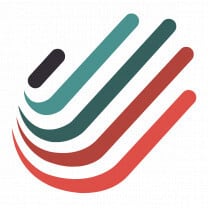
Established in 1994, just a month before the country’s legislative elections, the Forum for Labour and Liberties (FDTL) is a centre-left secularist party. Its establishment was the result of a call by 200 democrats, academics and defenders of human rights in 1993 for the unification of democratic forces. The party that was established by its current Secretary-General Mustapha Ben Jafar was only legalised in 2002. However, it failed to obtain government positions or seats in the parliament in the 2004 elections.
In the Constituent Assembly elections in October 2011, FDTL won 20 seats and took part in the coalition that consisted of Ennahda and the CPR. Its stated core values are transparency and openness. Its leader Ben Jafar was elected President of the Constituent Assembly in November 2011. During the parliamentary elections in 2014, the FDTL lost all seats. However, it is still a member of the Socialist International and the Progressive Alliance and an observer by the Party of European Socialists. In the 2019 parliamentary election FDTL did not win any seats either.
Ettakatol boycotted the 2022-2023 parliamentary elections due to the fact the elections wouldn’t be free and fair as did almost 90 percent of the political parties.
Other Parties
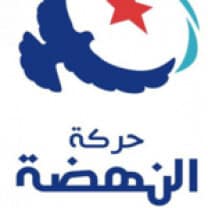
Initially established as Mouvement de la Tendance Islamique (MTI) in 1981. The party is theoretically shaped by the Egyptian Muslim Brotherhood and its key intellectual in the 1950s and 1960s, Sayyid Qutb. The party began as a rather radical one, but started to be described as moderate Islamist in the 1980s and changed its name to the current one in 1988 after Ben Ali’s National Pact that sought to separate religion from politics. They advocate democracy and a Tunisian form of Islamism also described as political pluralism.
In elections held in 1989, Ennahda came in second place to the RCD. Shortly afterwards, Ennahda was banned, and its leader Rachid Ghannouchi fled the country for the UK as he and other Ennahda members were prosecuted for “membership in an illegal organization.” After the collapse of the Ben Ali regime the Tunisian interim government granted the group permission to form a political party. The Ennahda party became the biggest and best organised party and won 89 seats in the 2011 Constituent Assembly elections.
Ennahda sees itself as an advocate of Islamic democracy, like Turkey's ruling Justice and Development (AKP) party. The party can be seen as a centre-right party that is sympathetic towards economic liberalism. Ennahda’s leadership has stressed that it supports equal rights for men and women, although only two women are at first position for the NCA election. Nevertheless, secularists remain wary of Ennahda, whose party’s strongest support comes from Tunisia’s rural interior.
The Ennahda Movement stepped down in January 2014 since the neutral interim government was established to make the final draft of a constitution, followed by early elections based on this new constitution. During the parliamentary elections in 2014, the party came in second with 69 seats (losing almost half of its seats) after the Nidaa Tounes party.In the parliamentary election of 2019 the Ennahda Movement came in first with 52 seats, 17 seats less than they won in 2014. This says something about how fractured the political landscape had become.
After the election Ennahda proposed ally Habib Jemli as prime-minister but that choice was not backed by parliament. The new candidate, Elyes Fakhfakh, proposed a cabinet in early 2020. Ennahda initially disagreed with the formation but after many negotiations the parliament backed the proposal with the support of Ennahda on the 26th of February. Ennahda did this for the sake of the country’s stability. Since then the party has been putting more and more pressure on the technocratic cabinet of Prime Minister Mechichi, making him replace 11 technocratic ministers with more “politically coloured” ministers.
Ennahda boycotted the 2022-2023 parliamentary elections due to the fact the elections wouldn’t be free and fair as did almost 90 percent of the political parties.
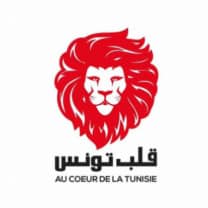
Qalb Tounes was first established on the 20th of June 2019 by media mogul Nabil Karoui. Soon after, in October 2019, the party participated in its first parliamentary election. It won 38 seats and became the second largest party. However, in the proposal of the new cabinet prime-minister candidate Fakhfakh decided to not include Heart of Tunisia in the formation. The party's leader Nabil Karoui, the owner of a major television company, has repeatedly been accused of corruption and actually ran his campaign for the presidential election in September 2019 from prison. Karoui was only allowed to run in the end, because the controversial bill to ban people from running if they had served prison time, was never ratified. Former President Beji Caid Essebsi died in July of 2019 before he could.
The parliamentary vote on the new cabinet was held on the 26th of February 2020 and received the backing of 129 out of 217 members. This gave Heart of Tunisia a place in the opposition, despite being the election’s biggest winner. The party has not been stable in the years afterwards though. With resignations of several party members, Heart of Tunisia’s number of seats has dropped from 38 to 27 in less than two years' time. The party is classified as a left-wing populist party, also having a secular ideology. The party is very much built around its leader Karoui.
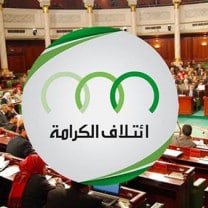
In the 2019 parliamentary election the relative newcomer Dignity Coalition won 21 seats, making it the fourth largest party. Since then two members have resigned from the party. The coalition was formed in February 2019 and consists of several different parties and independent people. The most notable of which are the Tunisian Reform Front, the Congress of the Republic (CPR), and the Justice and Development Party. Its manifesto unites those who aim to advance the goals of the revolution because to the coalition they seem uncompleted. In the 2011 revolution, one of the main slogans was "Karama', which translates to "Dignity".
The party can be classified as a far-right party. It is an Islamist party and considered a party in which populism and salifism are combined. The party fights for the implementation of Sharia law. Other party positions include its support for the death sentence penalty, its opposition towards gender equality and a proponent of further criminilisation of homosexuality. The party's leader Makhlouf is also highly critical of France, the country’s former overlord. Given all of this, the party is considered to be quite controversial.
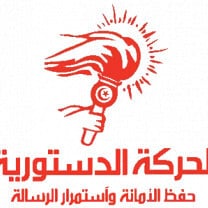
The Free Destourian Party was established on the 23rd of September 2013 by former members of the Democratic Constitutional Assembly. Former president Ben Ali, who fled to Saudi Arabia during the revolution to avoid prosecution, belonged to this party. After the revolution the Democratic Constitutional Assembly was banned and was eventually dissolved in March 2011. Up until August 2016 the Free Destourian Party was known under the name 'Destourian Movement' but decided to change the name around the same time it appointed new leader Abir Moussi. During the 2019 parliamentary election the party received 17 seats, making it the fifth biggest party at the time.
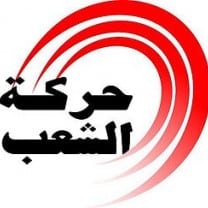
The current People's Movement is a socialist, secularist and Arab nationalist party that was established in April 2011. However, before April 2011 there was a political party with the same name that merged the Progressive Unionist Movement in March 2011. The new party was called the Progressive Unionist People's Movement. When some members disagreed with the merger they left and formed a new party which they again called the People's Movement party. Their slogan became "freedom, socialism, unity" and their leader became Mohamed Brahmi. However, in 2012 the Progressive Unionist People's Movement and the People's Movement decided to merge and continued under the name People's Movement.
The leader of the party continued to be Mohamed Brahmi. The party belongs to the Popular Front coalition and is aligned with workers groups. In 2013 Brahmi was shot dead in front of his house and Zouhair Maghzaoui became the new leader. Even though the party is part of the Popular Front, it decided to run on its own in the 2019 parliamentary election where it finished sixth with 15 seats. This proved to be a successful move for the party, as the Popular Front only received one seat in total. Since then the party has formed a parliamentary bloc together with the Democratic Current.
During the 2022/23 parliamentary elections the People's Movement was one of the few parties to take part. It obtained only one seat in parliament. The turnout was only 11 percent and most of the opposition parties declared the election 'illigitimate'.
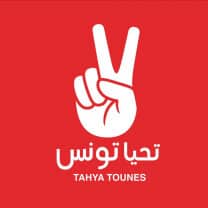
Tahya Tounes (Long Live Tunisia) was formed in early 2019 by political leaders that were formally associated with the president Beji Caïd Essebsi’s ruling party Nidaa Tounes. Disagreements within Nidaa Tounes, in particular about whether or not president Essebsi's son Hafedh Caid Essebsi was suitable to lead the party, caused prime-minister Youssef Chahed his membership. It was then that prime-minister Chahed and other prominent former members of Nidaa Tounes decided to form Tahya Tounes. The goal of the party is to implement efficient economic reforms in an attempt to return hope to the frustrated Tunisians. In the 2019 parliamentary election Tahya Tounes won 14 seats, making it the seventh biggest party. The party can best be classified as a centre and secular party.
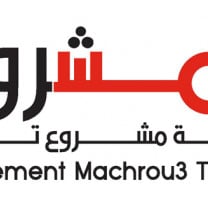
Machrou Tounes was founded by former member of Nidaa Tounes, Mohsen Marzouk, in March 2016. It includes members of the ‘Al-Horra’-bloc and several political figures, such as former minister Sadek Chaâbane. Important issues are the fight against terrorism and major reforms to improve the social and economic conditions. The party focuses on young people and women. With respect to the government, the party has an ambiguous stance. In its first parliamentary election in 2019, the party received 4 seats. Machrou Tounes is best classified as a centrist party, with a secular and nationalist ideology.
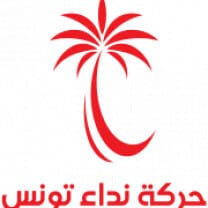
Nidaa Tounes was created in June 2012 under the impetus of Beji Caid Essebsi, a former Tunisian ambassador close to Habib Bourgiba and member of former President Ben Ali´s government. The party highlights several objectives: the introduction of a Constituent Assembly that will draft a solid constitution, a plan to save the national economy based on national consensus, a process of transitional justice aiming at finalising Tunisia´s post-Ben Ali transition, safeguarding individual freedoms and ensuring the neutrality of mosques. During the launch of the party on 16 June 2012, Essebsi asked all Tunisians to unite in favour of transition. Nonetheless, its creation has led to a bipolarisation of party politics in the country, by attracting all opponents to Ennahda.
During the parliamentary elections in 2014, the party won significantly and became the biggest party with 86 seats. However, it had some significant losses in March 2016, when Mohsen Marzouk announced the official creation of the Movement of Tunisia’s Project party. During the split in December of 2015 Marzouk brought several prominent former Nidaa Tounes members with him including more than twenty deputies in the parliament. In June 2016 there were several smaller transfers of deputies between the Free Patriotic Union and Nidaa Tounes, so in October 2018 the two parties merged and continued under the name 'Nidaa Tounes'. However, the continuous internal disputes and disagreements about who should lead the party were reflected in the 2019 parliamentary election where Nidaa Tounes only received 3 seats, 83 less than in the previous election. The party is considered to be a centre-left third-way party with a secular ideology.
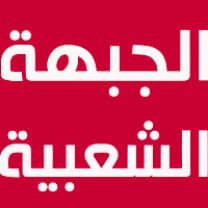
The Popular Front was formed in October 2012. It is a leftist political and electoral alliance in Tunisia. The front consists of nine political parties. It brings mainly left wing Tunisian parties together, including the Democratic Patriots’ Movement, the Workers’ Party, Green Tunisia, the Movement of Socialist Democrats, the Tunisian Ba’ath Movement, the Party of the Democratic Arab Vanguard, two different parties of the Iraqi branch of Ba’ath Party, and other progressive parties.
After the revolution in 2011, leftist parties decided to form the Popular Front in order to better consolidate the previously divided Tunisian left wing so as to be able to compete more effectively in the parliamentary elections in 2014. During the parliamentary elections in 2014, the Popular Front became fourth and gained 15 seats. However, in the 2019 parliamentary election it only received 1 seat. This has much to do with the left-wing party the People's Movement deciding to run the election campaign by itself, receiving 15 seats.
4 Biographies
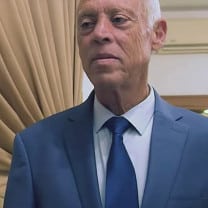
Kais Saied was born on the 22nd of February 1958 and grew up in a modest but intellectual household. He was a law professor at the University of Tunis until he retired in 2018. He served as the Secretary-General of the Tunisian Association of Constitutional Law between 1990 and 1995 and has been vice-president of the organization since 1995. Saied also served as Dean of the Law Department at the University of Sousse, as a legal expert for the Arab League and the Arab Institute for Human Rights. He was also part of the expert committee that was invited to offer comments on the draft Constitution of Tunisia in 2014. He was considered an outsider to politics before he was elected as president.
In 2019 Saied ran for president as an independent candidate and won with a 72% majority. Saied was deemed an unlikely winner, but his openness and obsession with equity connected with the Tunisian youth. Saied vowed to fight corruption and increase social justice, such as access to healthcare and water for all. Even though Saied has some conservative views on homosexuality and gender equality, he vowed to respect the social freedoms enshrined in law in recent years. The youth especially saw Saied as an honest leader that offered a future to Tunisia which was reflected in the presidential election results. It was estimated that 90% of young people between 18 and 25 voted for Saied.
On July 25, President Saied assumed executive authority after sacking the prime minister and suspending parliament. Since then, he has continually lengthened the state of emergency, and last week he brushed aside much of the 2014 constitution, giving himself power to rule by decree. President Saied has defended his actions by saying that they are needed to address a crisis of political paralysis, economic stagnation and a poor response to the coronavirus pandemic. He has promised to uphold rights and not become a dictator. Since July 25, Saied has constantly meddled in Tunisia’s judiciary and other important safeguards of its nascent democracy. He is therefore seen as the prime culprit for Tunisia’s post-2021 backsliding into authoritarianism.
Al-HAchani has limited power in the current Tunisian political set-up as Saied has taken much of the political power and is effectively ruling by decree.
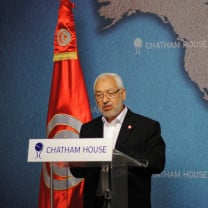
Party leader Ennahda / Speaker of the House of People's Representatives
Rached Kheriji, known as Rached Ghannouchi (1941) is one of the most prominent politicians in Tunisia. He co-founded the Ennahda Movement and is seen as its intellectual leader. He graduated from Zaytuna University in Tunis in 1962 before he attended Cairo University (Egypt) to study agriculture. After he was expelled from Egypt due to a row between former presidents Bourguiba and Abdel Nasser, Ghannouchi went to University of Damascus (Syria) where he majored in philosophy, and graduated in 1968.
Ghannouchi started forming his political views as a university student. Despite the fact that he initially joined a socialist party, his views gradually changed towards a more religious ideology. Ghannouchi then attended the University of Paris, Sorbonne. After studying there for a year, he returned to Tunisia and founded an organization to initiate reforms in the country. Based on his Islamic convictions, he, among others, established the Islamic Tendency Movement in 1981 to fight political pluralism and call for economic reconstruction.
Ghannouchi along with his followers was sentenced to 11 years in prison in 1981 where he was tortured. Many Tunisians across the political spectrum protested against their torture. Ghannouchi was released in 1984. After being sent back to prison in 1987 with a life sentence, he was released again in 1988. Eventually Ghannouchi was exiled to Algeria, and from there he moved to England in 1991 where he lived for over twenty years. During his exile, Ghannouchi was a tireless critic of the political regime in Tunisia. On 30 January 2011 Ghannouchi returned to Tunis for the first time in two decades.
His party, Ennahda, won 89 of the 217 seats in the Constituent Assembly's elections in October 2011, the second largest party following far behind with 29 seats. During the parliamentary elections in 2014, Ennahda almost lost 20 seats (to 69 seats) and in the 2019 parliamentary election this number dropped even further to 52 seats. However, Ennahda had become the largest party in parliament though. Since 13 November 2019 Ghannouchi has been the speaker of parliament and in that position has been the most vocal in opting for more “political colour” in the country’s cabinets.
In May, Ghannouchi was sentenced to a year in prison for incitement. The former parliament speaker was arrested in April for inflammatory statements. His lawyer announced that Ghannouchi is being sentenced for statements he made during a funeral speech last year for a member of his Ennahda party. In it, he allegedly said that the deceased “feared no ruler or tyrant, only god.”
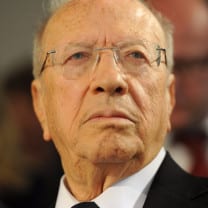
Beji Caid Essebsi was born on 29 November 1926 in Sidi Bou Said in Tunisia. He is a great-grandson of Ismail Caïd Essebsi, who was raised within the ruling family in the beginning of the 19th century and later became an important member in the government. Essebsi studied law in Paris and became a lawyer in 1952.
He was a follower of Tunisia's post-independence leader Habib Bourguiba. He joined Bourguiba as an adviser following the country's independence from France in 1956. From 1957 to 1971, he held various functions, such as Interior Minister from 1965 to 1969 and as Ambassador in Paris. In April 1981, he came back to the government under Mohamed Mzali as Minister of Foreign Affairs, serving until September 1986. From 1990 to 1991, he was the President of the Chamber of Deputies. In the aftermath of the Tunisian Revolution in 2011, Essebsi was appointed as new Prime Minister.
After the elections in 2011, when the new interim President Moncef Marzouki was appointed, Essebsi was replaced as Prime Minister. He then founded the secular Nidaa Tounes party, which won the parliamentary elections in 2014. He was also the party’s candidate in Tunisia’s first free presidential elections in 2014. In December 2014, in the second round of voting, official results showed that Essebsi won the presidential race. On 31 December 2014, Essebsi was sworn in as the first free elected President of Tunisia. Essebsi died on the 25th of July at the age of 92.
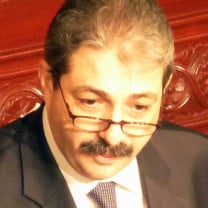
Khalil Zaouia (1961) is a Tunisian politician and former minister. Currently, he is the leader/Secretary-General of the Democratic Forum for Labour and Liberties – Ettakatol. Zaouia served as Minister of Social Affairs in the Jebali Cabinet, the first democratically elected government (2011-2014) after the end of the dictatorship. Apart from his political career, Zaouia has been a professor and orthopaedic surgeon at the Charles-Nicolle Hospital in Tunis. He is one of the founding members of Ettakatol (1994). In 2023 the party organized multiple demonstrations against the autocratic rule of President Saied.
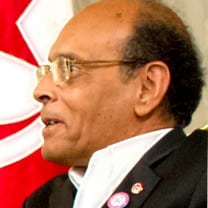
Former interim President of Tunisia and Founder of the Congress for the Republic (CPR)
Moncef Marzouki (1945) studied medicine in France. He was inspired by Mahatma Gandhi’s peaceful resistance and travelled to South Africa tot study its transition from Apartheid. After he returned to France he joined the Tunisian League of Human Rights and became an active human rights campaigner. He is widely respected for his opposition to former president Ben Ali which led to several arrests during his lifetime. In 2001 he founded the Congress for the Republic, which was banned in 2002. Still, Marzouki moved to France and continued running it. He only returned home after Ben Ali was ousted.
The interim parliament voted to elect Marzouki as president on 12 December 2011. He was elected as part of a power-sharing deal between the moderate Islamist Ennahda party and its two smaller secularist coalition partners, Ettakatol and Marzouki's Congress for the Republic. The deal gave the president limited powers. He was allowed to set Tunisia's foreign policy in consultation with the prime minister. The president was also commander-in-chief of the armed forces but could only appoint or fire senior officers in consultation with the prime minister. During Tunisia’s first free presidential elections, Marzouki was defeated by Beji Caid Essebsi.
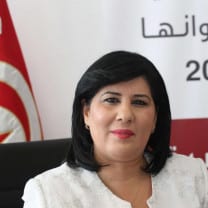
Party Leader of Free Destourian Party
Abir Moussi was born on the 15th of March 1975. She received a master degree in law and a DEA in economic and business law. She became a lawyer at the highest court in Tunisia (Court of Cassation) after graduation. She also became president of the litigation committee and member of the national forum for lawyers of the Democratic Constitutional Rally (RCD) and secretary general of the Tunisian Association of Victims of Terrorism.
After the 2011 revolution she joined the Destourian Movement. When she was appointed leader of the party in 2016, she changed the name to Free Destourian Party. The party is often called far-right and brings together supporters of the pre-revolutionary dominant Democratic Constitutional Rally (RCD) who are nostalgic for the authoritarian dictatorship of former president Ben Ali. Moussi therefore does not recognize the new Tunisian constitution that was established in 2014.
She also advocates for systemic imprisonment of homosexuals and opposed the plan for the government to grant men and women the same inheritance rights. She ran in the 2019 presidential election in which she came in ninth in the first round with 4.02% of the votes. The Free Destourian Party came in third in the parliamentary election of the same year, winning 6.63% of the votes which translated into 17 seats.
In October 2023 Moussi was datained for 48 hours and charged with processing personal data, obstructing the right to work, and assault intended to cause chaos after she held a sit-in in front of the Carthage Palace, the Tunisian presidential palace.
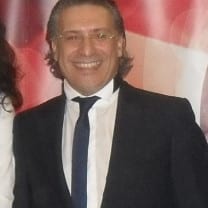
Nabil Karoui was born on the 1st of August 1963 in Bizerte. Karouis started his career in marketing and sales at several multinational corporations. He founded his own communications agency (KNRG) in 1996 together with his brother. In 2002 Karoui and his brother also founded a public relations firm named Karoui & Karoui World. The firm quickly grew and had offices all over the Middle East and North Africa. At the same time he established his international public relations company, Karoui also expanded his domestic business. He created subsidiaries around audiovisual production, digital media, urban advertising and he created a record label. In 2009 he became the head of the company's television company named Nessma.
During the 2011 revolution, Karoui used Nessma to begin a political debate on the ongoing protests after the government stopped several other channels from reporting on the unrest. After the revolution, Karoui continued using Nessma to provide the Tunisian people with new and quickly grew to one of the country's leading sources for information.
In October 2011 Karoui faced charges of "violating sacred values" and "disturbing public order" after showing the film 'Persepolis' on his channel. He was found guilty and ordered to pay a fine of 2400 dinars (approximately €1500). However, Karoui's criminal record did not stop there. On the 8th of July 2019 Karoui and his brother were charged with money laundering after NGO I-Watch accused them several times in 2016. He was arrested on the 23rd of August.
However, in June 2019 Karoui had announced his candidacy for the 2019 presidential election of which the first round was to be held on the 15th of September. Quickly after Karoui announced his intent to run, the parliament passed amendments to the country's electoral law blocking candidates with a criminal record from running. Immediately after, members of Nidaa Tounes and Popular Front filed a motion in parliament calling the move unconstitutional. This had little effect. The only reason the amendments did not go through in the end was because president Essebsi had not come around to signing them before his death. This meant that Karoui was still allowed to run. During that same time Karoui established a new political party named "Heart of Tunisia".
Thus, even though Karoui was allowed to run, his imprisonment in August meant that he was forced to lead his campaign from prison. Despite his incarceration Karoui came in second in the first round of the presidential election, winning nearly 16% of the votes with Elyes Saied only winning 2% more. Karoui was released from prison on October 9th 2019, just a few days before the second round of the presidential election. He was beaten in this round by Elyes Saied who received over 72% of the votes
His party, 'Heart of Tunisia', did better in the 2019 parliamentary election where it came in second after Ennahda Movement (19.63%) with 14.55% of the votes. However when it came to forming a new cabinet, Heart of Tunisia was left out of the formation after countless accusations of corruption. The party now serves in the opposition and has been in decline, as its share of seats dropped from 38 to 27. 11 party members have resigned in less than two years. Meanwhile, Karoui has been detained again in December of 2020 on the charge of tax evasion and money laundering and has been in prison since then. His party emphasized that he had not been found guilty. He was released from prison in June 2021.
Karoui was detained again in August 2021 in Algeria, after illegally crossing the border. After his release in October 2021, he headed to Europe to live voluntary exile. In November 2022 he was handed six month imprisonment in absentia by the Tunisian judiciary for the illegal border crossing.
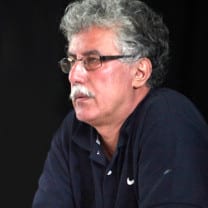
Hamma Hammami was born on the 8th of January 1952 in El Aroussa. In 1972 Hammami participated in the student revolt as well as in the banned opposition movement El Amal Ettounsi, for which he was sent to prison by then president Habib Bourguiba. He was only released six years later when Amnesty International started advocating for his release. In 1986 Hammami founded the Tunisian Communist Workers' Party (PCOT) of which, in one form or the other, he has been leader ever since. The party became officially legal after the 2011 revolution and in 2012 PCOT formed an alliance with several other parties to better streamline the Tunisian left wing, which became known as Popular Front. Hammami was named its leader.
He was also tortured and imprisoned for his political activism against the rule of former president Ben Ali because he was considered to be strong opposition. On January 12th 2011 he was again arrested for speaking to journalists about the Tunisian revolution, but he was released three days later when Fouad Mebazaa became interim president. After disputes within Popular Front about who should run in the 2019 presidential election on their behalf, Hammami decided to run as an independent. He only receives 0.69% of the votes. In the parliamentary election of the same year Popular Front also suffered major losses. It only won one seat, which is 14 seats less than in the 2014 parliamentary election.
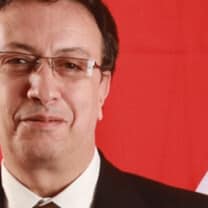
Hafedh Caïd Essebsi was born on the 1st of August 1961. He is the son of former president Béji Caïd Essebsi who died in office on the 25th of July 2019 at the age of 92. Before the revolution Hafedh was part of the Social-Liberal Party. After the revolution he joined the Nidaa Tounes party, which was founded by his father. Hafedh tried to head the party list during the 2014 parliamentary election, but his inexperience and proximity to members of the former Democratic Constitutional Rally (the party in charge before the revolution), ignited a lot of criticism from the left wing and many members of the party. This caused him to renounce his candidacy on August 22nd 2014.
He was named executive director of Nidaa Tounes in 2016, which prompted secretary general Mohsen Marzouk to leave and found his own party; Machrouu Tounes. On the 19th of October 2018 Hafedh became president of the party on the occasion of the merger with the Free Patriotic Union. During the 2019 parliamentary election Nidaa Tounes only received 3 seats, which is a 83 seat decline since the 2014 parliamentary election. The party has been in opposition since then and the party’s role has been marginalised.
Subscribe to our newsletter
